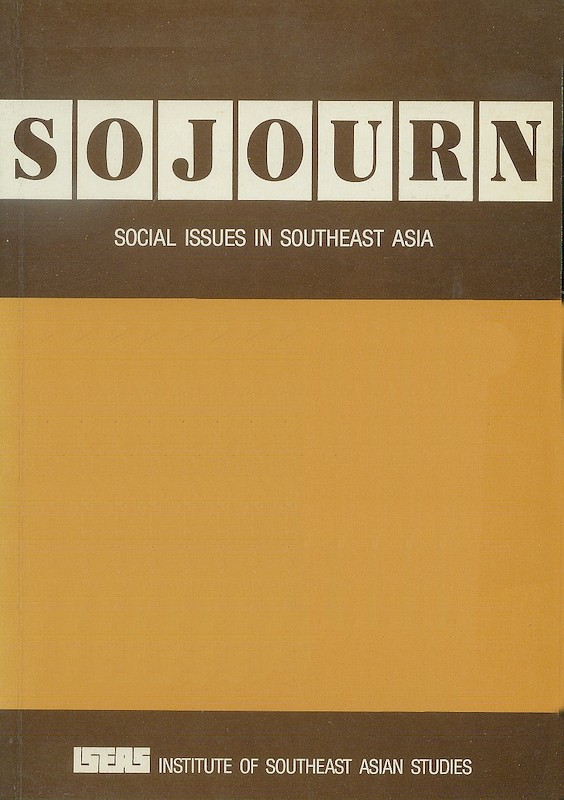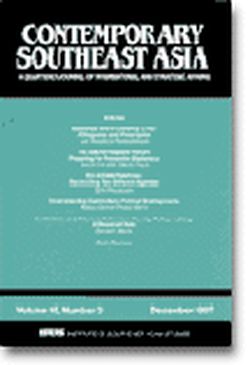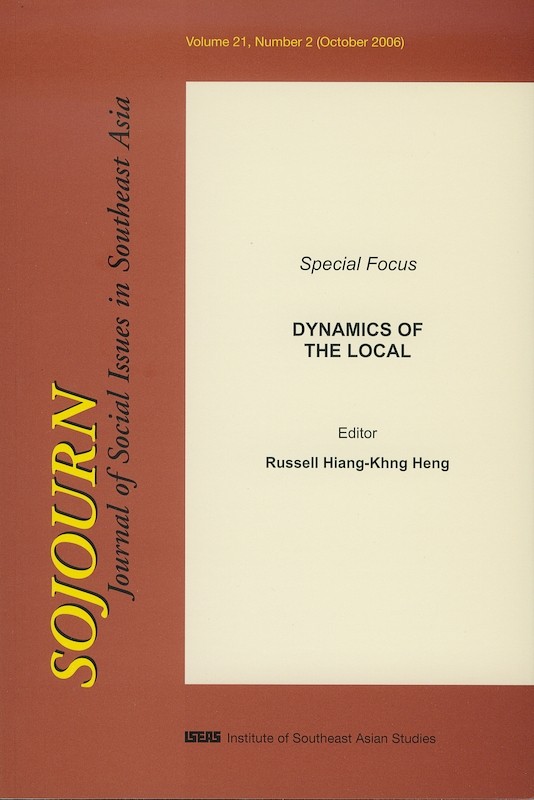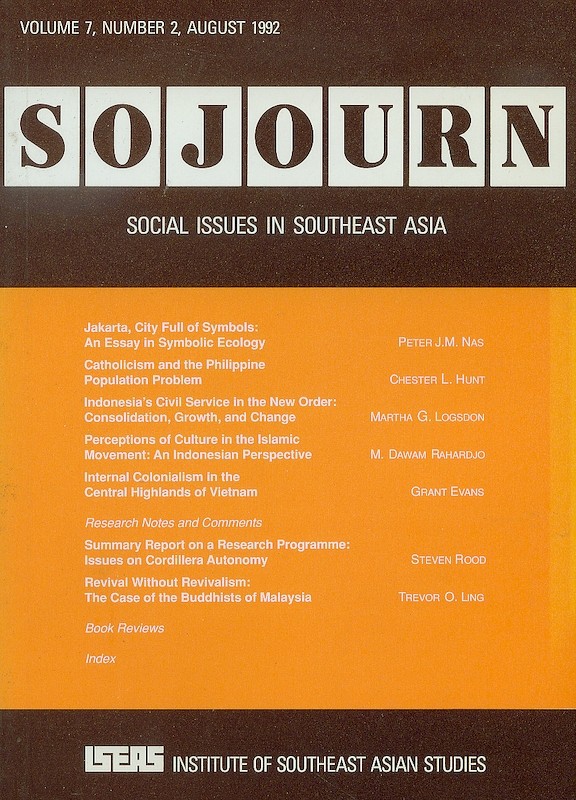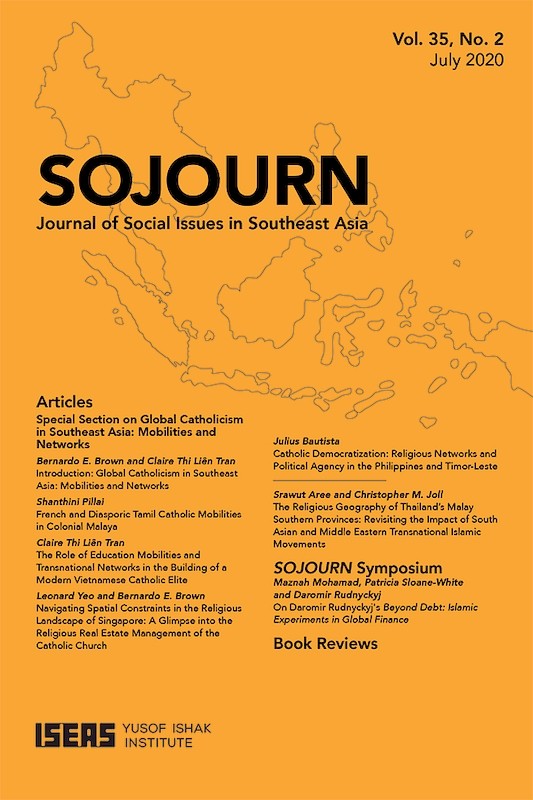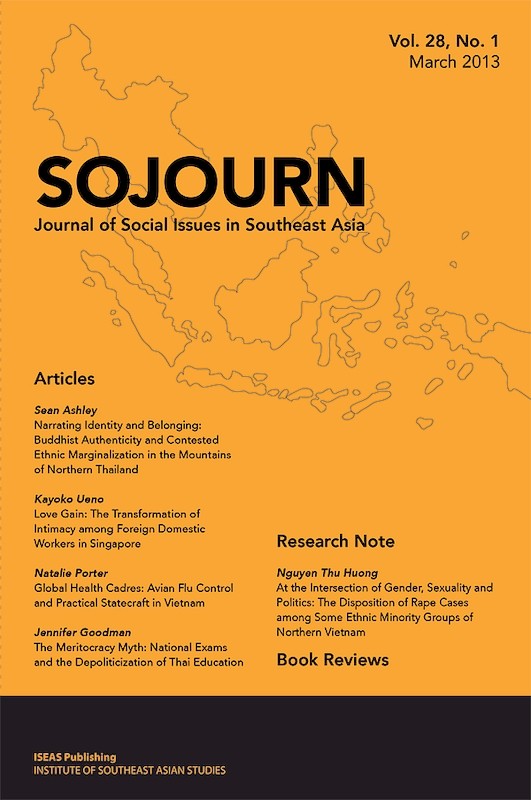SOJOURN: Journal of Social Issues in Southeast Asia Vol. 25/1 (April 2010): Special Focus on Religion and Politics in Southeast Asia
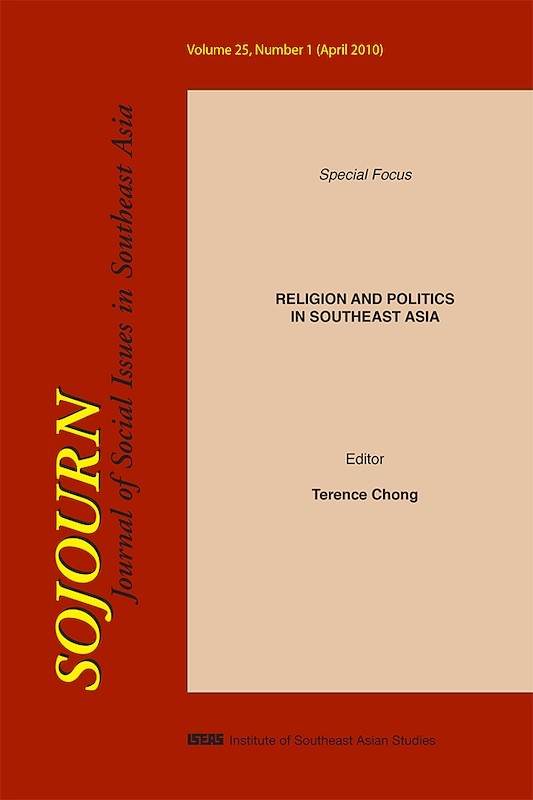
Terence Chong, editor
Date of publication:
April 2010
Publisher:
Institute of Southeast Asian Studies
Number of pages:
151
Code:
SJ25/1
Contents
-
SOJOURN: Journal of Social Issues in Southeast Asia Vol. 25/1 (April 2010): Special Focus on Religion and Politics in Southeast Asia
[Whole Publication] -
Preliminary Pages with Editor's Note
- ARTICLES
-
Commemoration and the State: Memory and Legitimacy in Vietnam see abstractThe commemorations of historical figures, both public and private, have become a powerful tool for politicians and historians in Vietnam to reconfigure the past, national heroes, and revolutionary martyrs. One of the states commemorative projects is devoted to glorifying the Hoang Sa (Paracel) and Truong Sa (Spratly) soldiers, and preserving all temples and relics related to their activities on Ly Son Island. This state project may be seen as a strategy to claim sovereignty in the face of competition from several nation states, including China, for control over the two archipelagos. Conversely, the Vietnamese state is also challenged by alternative accounts from the Ly Son people, who have introduced their own narratives. This essay analyses contestations over memory and the attempts of the Ly Son villagers to establish continuity with the past through their ancestors in order to demonstrate solidarity, patriotism, and their own prestige.
-
Church and State in the Philippines: Tackling Life Issues in a Culture of Death see abstractThis paper reflects upon the "life issues" of population growth and reproductive health in the Philippines in the context of the ongoing congressional deliberation of House Bill 5043. Specific attention is paid to the influence of the Roman Catholic Church upon this process, through an analysis of the institutional pronouncements and edicts made by the Catholic Bishops Conference of the Philippines (CBCP). It still remains to be seen whether HB5043 will be passed into law. What can be observed even at this stage, however, is that there may well be a discordance between Church proclamations regarding faith-based sexual morality on the one hand, and popular opinion and actual practices under difficult economic and social circumstances on the other. In this respect, sustainable population control in the Philippines continues to be an uphill battle, given the Church's persistent association of artificial contraception with a pernicious "culture of death".
-
State and Social Christianity in Post-colonial Singapore see abstractIn the context of Christianity's rapid growth in post-colonial Singapore, why has Pentecostalism replaced liberal Christianity as the dominant form in the last few decades? Going beyond existing cultural explanations of Pentecostal affinity with Asian folk religions and the modernization thesis, I look at the Church as social movement, as social Christianity engaging, specifically in Singapore, the post-colonial developmental state. Pentecostalism became popular after the state consolidated its rule in the 1980s and suppressed nascent liberal Christian movements. This is because, compared to its fundamentalist evangelical competitor, the Pentecostal development of Asian contextual theologies of spiritual warfare and blessings provided young Singaporeans with practical ideologies to make sense of the spiritual telos of the post-colonial nation and engage the developmental ethos of the state. Singaporean Pentecostalists are at the crossroads today, faced with a decision between the social justice emphasis of liberal Christianity and fundamentalist moral activism.
- RESEARCH NOTES AND COMMENTS
-
Vietnamese Party-State and Religious Pluralism since 1986: Building the Fatherland? see abstractWhile religion continues to be kept under close scrutiny by the Vietnamese state, an undeniably positive state discourse on religious practices has emerged since the 1990s. The current state approach towards religious practices and ceremonies has transformed religion from a strictly private affair to a matter of public interest, with political leaders participating in religious festivals on behalf of the state, and religious institutions being recognized as a lasting contribution towards "building the fatherland". This essay looks at the Vietnamese state's management of religious activities and explores the extent to which religious attitudes and practices are co-opted for nation-building and state-affirming purposes. It concludes with a discussion on the relations between the religious and the political sphere in doi moi Vietnam.
-
Missionary Intent and Monastic Networks: Thai Buddhism as a Transnational Religion see abstractBuddhism, like other world religions, is a transnational religion. Its popularity and expansion are built around intensive religio-cultural networks across nation-states' boundaries. The subject under investigation in this essay is the expansion of Buddhism from Thailand to international communities abroad. I argue that the transnationalization of Thai Buddhism since the late twentieth century has emerged out of global cultural junctures, where missionary intent and monastic networks have joined forces. The transnationalization of Thai Buddhism should be understood under the triple entwining forces of (1) the growth of Thai migrant communities abroad; (2) the Buddhist missionization abroad policy sponsored by the Sangha and the Thai government through the Ministry of Education and, recently, the Office of National Buddhism under the Ministry of Culture; and (3) the growing global interest in Buddhism in international communities and subsequent travel and exchanges concerning Buddhist ordination and meditation as well as commodification between Thailand and its transnational Buddhist communities.
- BOOK REVIEWS
-
BOOK REVIEW: Southeast Asian Lives: Personal Narratives and Historical Experience, edited by Roxana Waterson
-
BOOK REVIEW: State Terrorism and Political Identity in Indonesia: Fatally Belonging, by Ariel Heryanto
-
BOOK REVIEW: Land and Longhouse: Agrarian Transformation in the Uplands of Sarawak, by R.A. Cramb
-
BOOK REVIEW: Beyond the Green Myth: Borneos Hunter-gatherers in the Twenty-first Century, edited by Peter Sercombe and Bernard Sellato

